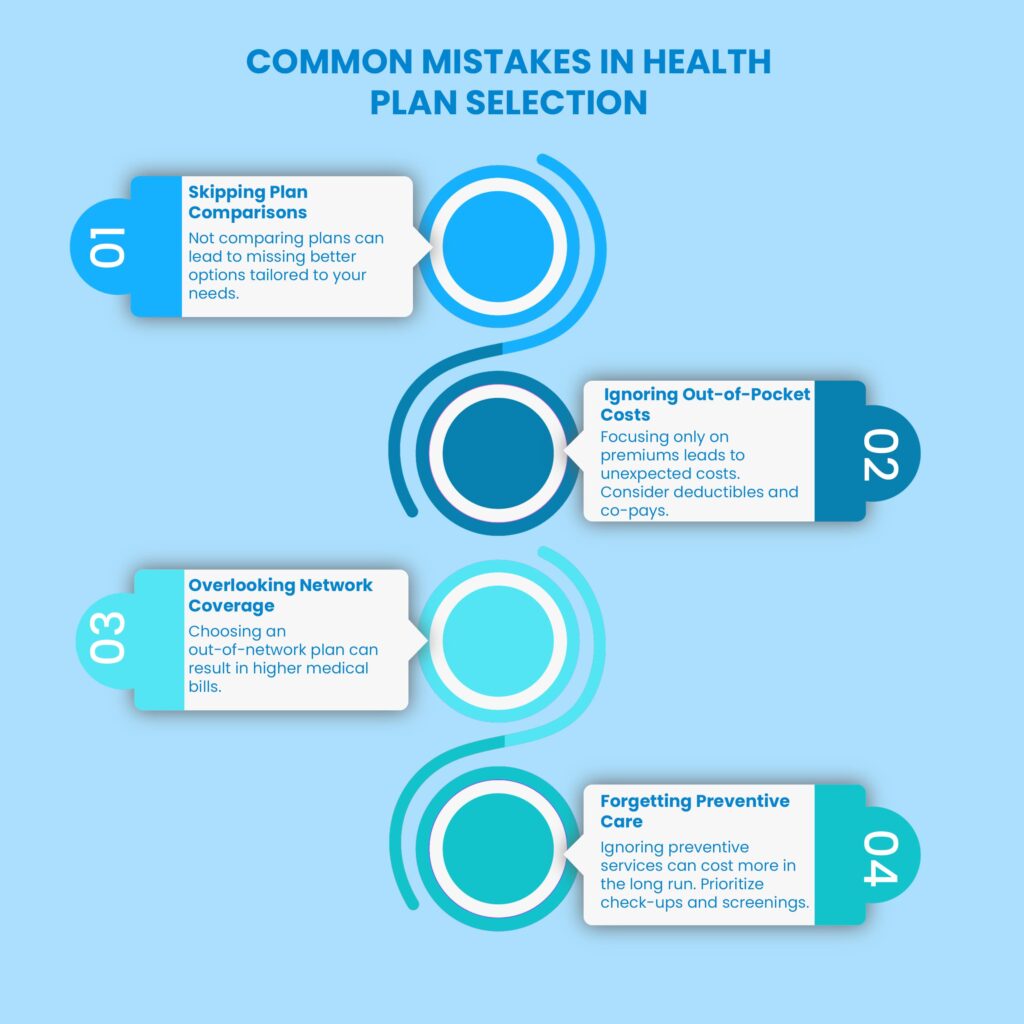What These People Did Wrong in Choosing Their Health Plan

Choosing the right health plan is crucial for both individuals and businesses, yet it’s easy to make mistakes during the selection process. Many people focus on only a few aspects, like monthly premiums, without fully understanding the broader picture, which can lead to higher costs and dissatisfaction in the long run. Failing to check the provider network, overlooking prescription drug coverage, and ignoring mental health services are just a few of the common pitfalls that people encounter. At Harbor Group, we have identified the frequent mistakes people make when choosing a health plan, and our goal is to help you avoid them, ensuring you find the right coverage that fits your needs and budget. Here are some of the key missteps people make—and how you can steer clear of them.
1. Focusing Only on the Premium Costs
One of the biggest mistakes people make is choosing a health plan solely based on the premium. While a lower premium may seem appealing at first, it’s important to remember that premiums are just one part of the total cost of healthcare. Plans with low premiums often come with higher deductibles, co-pays, and out-of-pocket maximums, which can significantly increase your total healthcare expenses.
What You Should Do:
- Look beyond the monthly premium and evaluate the total cost of the plan, including deductibles, co-pays, and out-of-pocket limits.
- Consider how often you and your family use healthcare services to determine the best balance between premiums and other costs.
2. Not Checking the Provider Network
Another common mistake is failing to check whether your preferred doctors, specialists, and hospitals are included in the plan’s provider network. Some plans, particularly Health Maintenance Organization (HMO) plans, may have more restrictive networks that limit your access to certain providers. If your doctor or hospital isn’t in-network, you may have to pay significantly higher costs or lose access to them entirely.
What You Should Do:
- Review the provider network carefully before selecting a plan to ensure your preferred healthcare providers are included.
- If you travel frequently or live in multiple locations, make sure the plan’s network includes coverage in those areas.
3. Ignoring the Coverage for Prescription Drugs
Prescription drug coverage is another key component of health plans that people often overlook. Different plans cover medications at varying levels, and some may have restrictive formularies, meaning only certain drugs are covered. Failing to consider how a plan covers your prescription medications can lead to unexpected out-of-pocket costs.
What You Should Do:
- Review the prescription drug coverage offered by the plan, including the formulary (list of covered drugs).
- If you take regular medications, ensure that they are covered and that the co-pays or co-insurance rates are reasonable.
4. Not Taking Advantage of Preventive Care Services
Many health plans offer preventive care services at no extra cost, including annual check-ups, screenings, and vaccinations. However, some people choose plans without understanding what preventive services are included, missing out on important opportunities for maintaining their health and preventing more serious issues later.
What You Should Do:
- Choose a health plan that covers a wide range of preventive services, as this can save you money and keep you healthier in the long run.
- Familiarize yourself with the preventive care benefits included in your plan so you can take advantage of them.

5. Overlooking the Importance of Mental Health Coverage
Mental health is a crucial aspect of overall well-being, but many people fail to consider mental health services when choosing a health plan. Some plans may limit the number of therapy sessions or mental health services available, while others may have fewer in-network providers for mental health care.
What You Should Do:
- Check the plan’s mental health coverage, including therapy, counseling, and psychiatric care.
- Make sure the plan includes a robust network of mental health providers, particularly if you or your family members need access to these services.
6. Failing to Anticipate Future Healthcare Needs
Many people choose health plans based on their current health status without considering future healthcare needs. Life events such as starting a family, getting older, or managing chronic conditions can dramatically change your healthcare requirements. Not anticipating these changes can lead to inadequate coverage down the road.
What You Should Do:
- Consider potential future healthcare needs, such as maternity coverage, aging-related care, or treatment for chronic conditions.
- Choose a plan that offers flexibility and comprehensive coverage that can adapt to your changing healthcare needs.
7. Skipping Out of Telemedicine Options
With the rise of telemedicine, many health plans now offer virtual consultations as part of their coverage. However, some individuals overlook the benefits of telemedicine or assume it isn’t important. Telemedicine can save you time and money, especially for routine consultations and follow-ups.
What You Should Do:
- Opt for a health plan that includes telemedicine services as part of its coverage.
- Take advantage of virtual consultations for minor illnesses, medication management, or routine follow-ups to save on in-person visits.
8. Ignoring Customer Service and Support Options
Customer service is an often overlooked aspect of health plans. Some plans may have limited support options, making it difficult to resolve issues, understand your coverage, or get help when you need it. Without responsive customer support, navigating your health plan can become frustrating and time-consuming.
What You Should Do:
- Before choosing a plan, review the customer service and support options available, including call centers, online chat, or mobile apps.
- Choose a plan with accessible and responsive customer service to help you when questions or issues arise.
Choosing the right health plan is one of the most important decisions you can make for your well-being and financial stability. Avoiding these common mistakes can help you select a plan that provides the right coverage, minimizes unexpected costs, and supports your healthcare needs. At Harbor Group, we’re here to guide you through the process, helping you avoid pitfalls and find the best plan for your specific situation.
If you’re looking for expert advice on selecting the right health plan, contact Harbor Group today. We’re dedicated to helping you make informed decisions and ensuring you get the best possible coverage for your business.
To know more about how an affordable health plan can empower you, do check out our previous blog, “Say Goodbye to Stressful Medical Costs: Get An Affordable Health Plan Today!”
Published on: Jan 23, 2025
